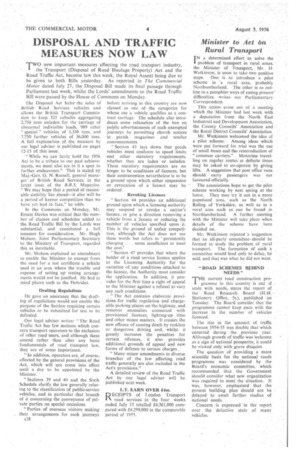DISPOSAL AND TRAFFIC MEASURES NOW LAW
Page 30

If you've noticed an error in this article please click here to report it so we can fix it.
'f TWOnew important measures affecting the road transport industry; WO Transport (Disposal of Road Haulage Property) Act and the Road Traffic Act, become law this week, the Royal Assent being due to be given to both Bills yesterday. As reported in The Commercial Motor dated July 27, the Disposal Bill made its final passage through Parliament last week, whilst the Lords' amendments to the Road Traffic Bill were passed by the House of Commons on Monday.
The Disposal Act haltsthe sales of British Road Services vehicles and allows the British Transport Commission to keep 325 vehicles aggregating 2350 tons unladen for the carriage of abnormal indivisible loads, 989 other
special" vehicles of 3,330 tons, and 7,750 further vehicles of 36,000 tons. A full explanation of the measure by our legal adviser is published on pages
12-13 of this issue. .
"While we can fairly hold the 1956 Act to be a tribute to our past achievements, we must also see in it a spur to further endeavours." This is stated by Maj.-Gcn. G. N. Russell, general manager of British Road Services, in the latest issue of the B.R.S. Magazine. "We may hope that a period of reasonable stability lies ahead—it also will be a period of keener competition than we have yet had to face," he "adds.
In the Commons on Monday, Mr. Ernest Davies was critical that the number of clauses and schedules added to the Road Traffic Bill by the Lords was substantial, and constituted a full measure for consideration. Mr. Hugh Molson, Joint Parliamentary Secretary to the Ministry of Transport, regarded this as inevitable.
Mr. Molson explained an amendment to enable the Minister to exempt from the need for a test certificate a vehicle used in an area where the trouble and expense of setting up testing arrangements would not be justified. He had in mind places such as the Hebrides.
Drafting Regulations He gave an assurance that the drafting of regulations would not enable the purpose of the Section requiring certain vehicles to be submitted for test to be defeated.
Our legal adviser writes: "'The Road Traffic Act has few sections which concern transport operators to the exclusion of other road users, and although these amend rather than alter any basic fundamentals of road transport law, they are of some importance.
In addition, operators are, of course, affected by the general provisions of the Act, which will not come into effect until a day to be appointed by the Minister.
" Sections 39 and 40 and the Sixth . Schedule clarify the law generally relating to the classification of public-service vehicles, and in particular that branch of it .concerning the conveyance of private parties on special occasions.
"Parties of overseas visitors making' their arrangements for such journeys a28 before arriving in this country are now
classed as one of the categories for whose use a vehicle qualifies as a contract carriage. The schedule also introduces some relaxation of the ban on public advertisements of such exempted journeys by permitting church notices in parish, magazines and similar announcements.
"Section 43 lays down that goods
vehicles must conform to speed limits and other statutory requirements, whether they are laden or Unladen. These statutory requirements are no longer to be conditions of Licences, but their contravention nevertheless is to be a ground upon which either suspension or revocation of a licence may be ordered.
Revoking Licences "Section 44 provides an additional
ground upon which a licensing authority may suspend or revoke a carrier's licence, or give a direction removing a vehicle from a licence or reducing the number of vehicles specified upon it. This is the ground of unfair competition, although the Act does not use these words but refers to persistently charging . . . sums insufficient to Meet the cost.'
"Section 47 provides that where the
holder of a road service licence applies to the Licensing Authority for the variation of any conditions attached to the licence, the Authority must consider the application. fn addition, it provides for the first time a right of appeal to the Minister against a refusal to vary any such conditions.
"The Act contains elaborate provi
Sidms.for traffic regulation and chargeable parking places on the highway, and removes anomalies connected with provisional licences, lighting-up time and other minor matters. It creates the new offence of causing death by reckless or dangerous driving and, whilst it greatly increases the penalties for certain offences, it also provides additional grounds of appeal and new forms of defence to certain charges.
" Many minor amendments to diverse branches of the law affecting road traffic generally are also included in the Act's provisions."
A detailed review of the Road Traffic Act by our legal adviser will be published next week.
L.T. EARN OVER Um.
RECEIPTS of London Transport road services in the four weeks ended July 15 totalled £4,361,000 compared with 14,299,000 in the comparable period of 1955.




































































































